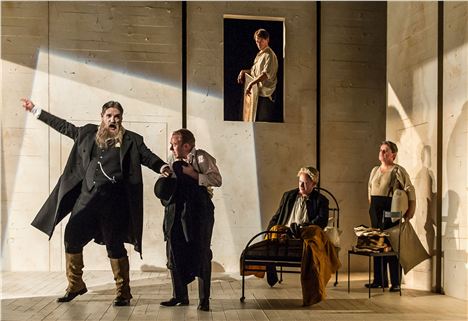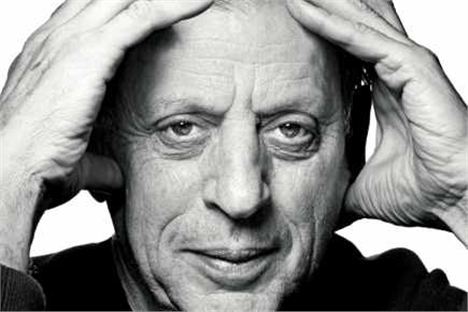MUSIC Theatre Wales have performed Glass operas before – I was lucky to catch their Fall of the House of Usher back in the late 80s – and this world premier is another feather in their cap.
Glass' music, with its descending arpeggios, its rhythmic, pulsing modulations, is perfect in transmitting the uncanny uncertainty that the novel revels in.
Based on Franz Kafka's modernist masterpiece, Josef K wakes on the morning of his 30th birthday and is arrested. He doesn't know why, it is never actually explained, friends and relatives implore him to take the charge more seriously, the Court is convened in more and more unlikely place and by the end he is resigned and ... well, it's an opera, it doesn't end happily.
Although to call it an opera is a little misleading, as it is more 'sung theatre'. There aren't any arias as such, and the words follow the score meticulously, and those words by the Oscar-winning playwright/screenwriter, Christopher Hampton, taken direct from the novel, are definitely prose and not poetry. Where the production comes alive is through the staging and the exceptional performances.
 l-r Michael Druiett, Johnny Herford, Gwion Thomas, Nicholas Folwel, Paul Curievieci (Credit: Clive Barda)
l-r Michael Druiett, Johnny Herford, Gwion Thomas, Nicholas Folwel, Paul Curievieci (Credit: Clive Barda)
Glass' music, with its descending arpeggios, its rhythmic, pulsing modulations, is perfect in transmitting the uncanny uncertainty that the novel revels in. The three walls of the set, and various openings, allow people to look down and peer on Josef wherever he is, and disembodied arms pass him his coat, or a plate. He is always observed. Two guards, with impressive moustaches, great coats and bowler hats come across like psychotic Thompson twins (from Tintin, not the pop group). They are jobsworths who have no idea what job it is they are actually doing and are sinister and funny simultaneously. Two women seduce Josef for no discernible reason but are scarily, sexily successful. Some of the entrances are sinister and hilarious, as a character sidles on, or just a head appears in a doorway.
The music is more varied than 'early Glass'. The twelve musicians are impeccable, and Glass uses witty woodblocks, celeste, pumping brass, producing jaunty interludes and burlesque tunes to break up the flow.
Johnny Herford is perfect as Josef, moving from uncomprehending, to challenging through to acceptance. All of the other cast members double up and there isn't a weak link. As a whole, you are presented with a really unsettling estrangement, and you end up laughing at lines like 'This is my bicycle license', 'I was very tempted by your underwear' and 'You look like a couple of tenors'.
The production is moving onto Aberystwyth, Oxford, Cardiff, Mold and Birmingham over the next couple of weeks. It is nearly sold out everywhere, but if you happen to be in any of those places, it is not to be missed. Happily, Glass fans can catch the man himself with his ensemble at the Bridgewater Hall on November 10th, performing pieces from his 50 year career – including excerpts from The Civil Wars, Music in 12 Parts, Koyaanisqatsi and Façades.
The Trial is co-commissioned by Music Theatre Wales, The Royal Opera, Theatre Magdeburg and Scottish Opera: http://thetrial.musictheatrewales.org.uk/















